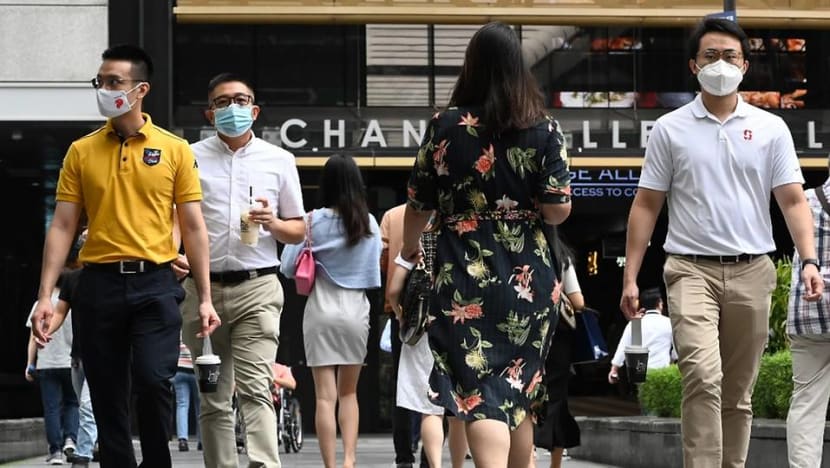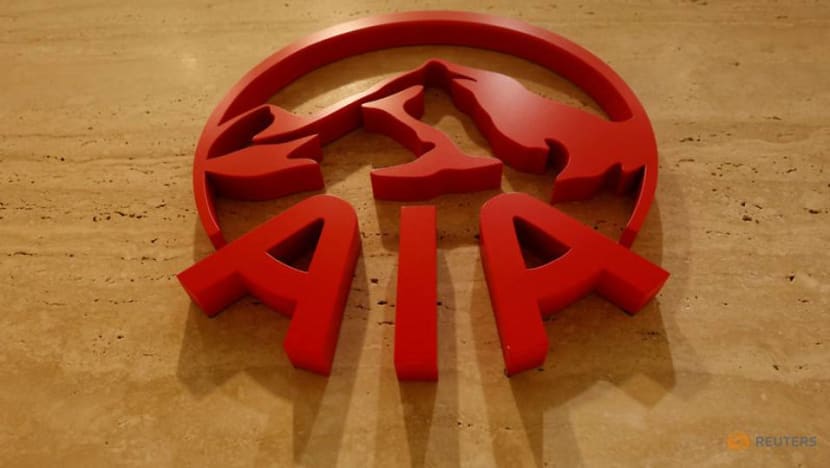COVID-19 spurs demand for some insurance products, but insurers watching long-term impact of pandemic

People walk during their lunch break in the financial business district of Raffles Place in Singapore on Jan 11, 2021. (Photo: AFP/Roslan RAHMAN)
SINGAPORE: Amid the COVID-19 pandemic, life insurers have seen higher demand for some of their insurance products as people rethink their health and financial plans.
These include policies that cover critical illnesses, have lower premiums or shorter terms, as well as investment-linked plans, they told CNA.
“COVID-19 has generally led Singaporeans to become more aware of protecting themselves and their loved ones … which is why in the past year we have observed Singaporeans becoming more proactive in seeking insurance solutions for their own peace of mind,” said AIA Singapore’s chief customer and digital officer Melita Teo.
For instance, the insurer has sold more single-premium investment-linked plans last year. Given the dour economic climate and market downturn, people have taken to these plans that are now available at “a lower unit price” in the hope of potential gains when a recovery comes round, said Ms Teo.
Great Eastern similarly observed a “significant increase” in the demand for its investment-linked plans.
With the pandemic fueling uncertainties about jobs, such plans, which combine both insurance and investment elements, have appealed to those who want to be able to adjust their coverage or investments according to their protection needs or wealth accumulation goals at different life stages, said the insurer’s head of propositions and portfolio management Eddy Lim.
READ: Pandemic-proofing: Insurance may never be the same again
Health insurance is another area where Great Eastern has seen greater interest.
“The pandemic has resulted in more people placing more importance on protecting themselves and their loved ones against unforeseen events such as death, and they appreciate if COVID-19-related claims are included in such health plans too,” added Mr Lim.
Aviva Singapore noted higher interest for term and whole life protection insurance plans, as well as critical illness policies with early and multiple-claim designs. For the latter, the take-up rate grew more than 20 per cent year-on-year, said director of product and marketing Daniel Lum.
Other insurers observed an increased demand for policies with shorter terms and lower premiums.
“While the uncertain economic environment may be the reason for many to hold back from making long-term financial commitments, we have seen a surge in demand for shorter-term plans that are able to offer good returns as customers seek alternatives to increase their savings amidst the low interest environment,” said NTUC Income’s general manager for consumer business Fabian Ng.
At Prudential Singapore, products that are “bite-sized with lower entry-level premiums” have been popular. These are typically plans with affordable premiums – from as low as S$5 for a 12-month plan that covers up to S$10,000 against prostate cancer – and are accessible and easy to purchase.
“Given the current uncertain economic outlook, these products are well received by customers who are looking for more affordable insurance coverage,” said Mr Stanley Ng, its head of product management.
IMPACT ON INDUSTRY
While these shifts in demand present opportunities, the pandemic and uncertainties surrounding how long it might last and the extent of its problems serve up risks.
Pressure on sales and premium collection, market volatility as well as not knowing how many people will file claims for death, long-term illness or disability due to the novel coronavirus are among these risks, according to industry experts.
READ: Analysis: Insurers, drugmakers sail into unknown with COVID vaccine rollout
So far the impact seems muted for life insurers here.
Figures from the Life Insurance Association Singapore (LIA) showed new business, in terms of total weighted premiums, down 13 per cent year-on-year to S$1.66 billion in the first six months of 2020, as strict distancing measures were enforced during the "circuit breaker" period and Phase 1 of Singapore's reopening.
This was to be expected as insurance is predominantly sold face-to-face in Singapore, said Mr Paul Brenchley, a partner at KPMG Singapore where he leads the insurance advisory practice for ASEAN.
But sales recovered over the second half of the year, with new business premiums hitting S$2.99 billion in the third quarter and S$4.38 billion in the final quarter, according to LIA’s figures.
“Some pent-up demand has come through as people get more concerned about their overall health and insurance coverage. Also, insurers have been rolling out new digital tools to connect with customers, as opposed to having to meet face to face,” said Mr Brenchley.
READ: Borrowers to get more time to repay loans as MAS extends financial relief measures
“My sense is that claims numbers have come down as well,” he added, noting that many people had put off non-emergency treatments amid the pandemic, especially during the second quarter. In addition, Singapore has a lower rate of COVID-19 cases compared with other parts of the world.
“Had the situation in Singapore been worse, I think the claims numbers would have been quite different,” said Mr Brenchley. “I doubt there’ll be a big drop in the top line from 2019 to 2020 … 2020 might be a reasonable year for some of the insurers.”
In terms of claims arising from COVID-19, life insurers told CNA that these have been minimal.
NTUC Income said it has approved two life insurance claims for deaths related to the novel coronavirus to date.
Prudential Singapore did not provide figures, but said the number of COVID-19 claims is “very small”.

Similarly at Aviva Singapore, it has not received many COVID-19 life insurance claims thus far and financial impact on the company has been minimal.
AIA Singapore said it paid out more than S$540,000 worth of claims to about 500 individual and corporate customers who suffered from COVID-19 and needed financial help for their medical bills.
“Whilst COVID-19 has raised issues and challenges for insurers worldwide, the situation in Singapore has been well controlled. As such the impact of increase in mortality and morbidity claims on AIA Singapore have been small,” said Ms Teo from AIA Singapore.
This explains why insurers have been proactive with support measures, according to KPMG’s Mr Brenchley.
These include allowing the deferment of premium payments and complimentary access to telemedicine services. Customers are also covered for COVID-19 through their existing plans, according to the insurers that CNA spoke to.
More recently, all seven Integrated Shield Plan insurers announced that they were extending coverage to include hospitalisation resulting from COVID-19 vaccination complications. This will last until the end of this year.
READ: Integrated Shield Plans to cover hospitalisation due to COVID-19 vaccine complications
Insurers also rolled out initiatives on their own. For instance, Great Eastern launched a S$1 million vaccine fund for its customers last month, while AIA extended free COVID-19 additional coverage for its policyholders until end-June this year.
“WAITING PERIODS”
But as unknowns remain on the horizon, the industry is taking some precautionary steps.
Reuters reported last month that some global life insurers have imposed waiting periods before COVID-19 patients, including those who have recovered, can apply for coverage.
These come as some reinsurers demand new safeguards from life insurers they backstop and as the insurance industry tries to assess the problems caused by the novel coronavirus, the Jan 25 report said.
“With COVID-19 cases still increasing around the world, I think we will continue to see reactions from insurers and particularly, some of the reinsurers as well as they look at their margins and some of their exposures,” said KPMG’s Mr Brenchley.
In Singapore, similar measures are in place.
NTUC Income has a waiting period of one to three months for applications of new health or life insurance plans by those who have recovered from COVID-19. This was implemented on the back of recommendations from its reinsurers, said Mr Ng.
“Currently, those who have fully recovered without complications can be considered for all types of insurance. It is our priority to ensure that everyone can continue to get access to insurance coverage, and we will continue working with our reinsurers to review the guidelines imposed for the assessment of COVID-19 risks,” he added in an emailed response.
READ: COVID-19 insurance now available for travellers visiting Singapore
Great Eastern also said its underwriting assessment criteria for different insurance products is subject to guidelines from reinsurers for the local market.
At the moment, coverage will be postponed by three months for new policy applicants diagnosed with COVID-19 and have to be hospitalised. After “at least three months or more” since the diagnosis, a statement by the applicant’s attending doctor will be required for application assessment.
For those with COVID-19 but do not need to be hospitalised, the postponement of coverage will be four weeks since the diagnosis. After which, a statement from an attending doctor will also be required.
Apart from new applications, both waiting periods also apply to the reinstatement of lapsed policies by existing policyholders. Great Eastern does not limit coverage for COVID-19 patients and those who have recovered can purchase its insurance.
“At this point, we are not able to confirm if this is a permanent rule as it is still a relatively new ailment and reinsurer guidelines may evolve over time,” said Mr Lim.
Aviva Singapore accepts new insurance policy applications from those who have fully recovered from COVID-19 but said there could be “a short delay” depending on health conditions.
AIA Singapore said its approach to assessing the insurability of those who had COVID-19 is similar to other medical conditions.
“In general, customers are advised to apply for coverage at least one month after they have recovered and/or discharged from medical institutions. After receiving their application, a medical report will be obtained upon our customer’s consent to assess their insurability for the type of coverage they applied for,” said Ms Teo.

Prudential said it does not impose waiting periods nor limit coverage, and told CNA that recovered COVID-19 patients “go through the same underwriting process as other individuals”.
LONGER-TERM RISKS
Moving forward, vaccines will be a key factor to watch.
“It will be interesting to see how vaccines will feed into insurers’ underwriting decisions,” said Mr Brenchley. “Say if I've been vaccinated and you haven't been vaccinated, is your insurance policy then more expensive or is mine cheaper?”
While the industry is no stranger to major crises, mass COVID-19 vaccination programmes that are being rolled out across the world are unprecedented.
“I think that’s something that the industry is working through at the moment,” he added.
Asked if Great Eastern sees any risks in a protracted pandemic and whether the availability of vaccines changes its outlook, Mr Lim replied: “This protracted health crisis may cause more people to re-examine their health insurance needs, and we see a rise in people getting health insurance plans and seeking telehealth services which offer medical consultations to customers.
“As the medical risks of COVID-19 are still evolving and new vaccines are being developed to contain the virus, we will need to assess the long-term impact of COVID-19 for forward planning.”
READ: As globe gallops into vaccine trials, insurers remain unfazed
The pandemic’s toll on the global economy will also be bad news for insurers, given how it could affect people’s discretionary income and the ability to repay insurance premiums.
Meanwhile, a persistent low interest rate environment is set to be another challenge given how life insurers tend to invest in long-term bonds, said Mr Brenchley.
When asked about longer-term risks, Aviva Singapore described the “uncertain and turbulent” global financial market as a “bigger threat” that is affecting the return rates of insurance products.
But it also pointed out that the availability of vaccines is likely to support the recovery of the global economy.
And just like other sectors, insurers are also not spared from the accelerated pace of digitalisation.
Given how sales in the industry used to be done predominantly in a face-to-face manner, many insurers have had to step up on their digital tools, both for their agents and customers, last year, noted Mr Brenchley.
“There is a risk of failing to react in this area … and at this time especially when a lot of interactions (have gone) online, if one isn’t, then they’ve got themselves in trouble.”
BOOKMARK THIS: Our comprehensive coverage of the coronavirus outbreak and its developments
Download our app or subscribe to our Telegram channel for the latest updates on the coronavirus outbreak: https://cna.asia/telegram















